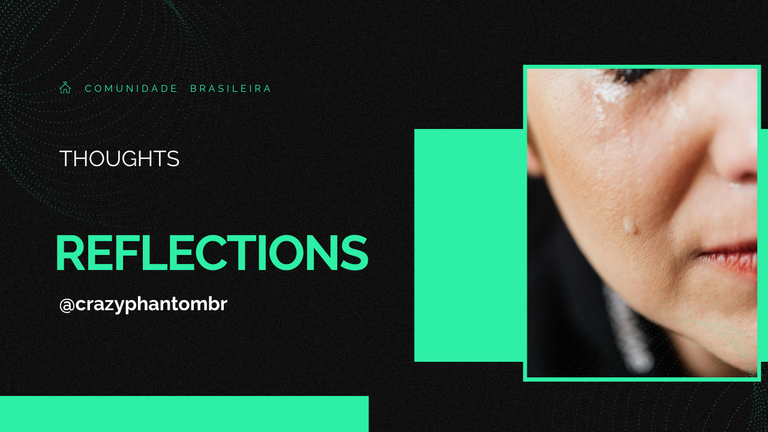
This content was written in Portuguese and was translated using translate tool.
You can read the original just below.
To my new friends from the Emotions & Feelings community, my warmest greetings! This time we were invited to participate through the #juneinleo program and I was very happy to get to know this community, which I am very interested in. I immediately felt obliged to join you, and then I did the initial readings to adapt to the community rules.
I apologize if I didn't meet all of them. I assure you I intend to improve!
"Our life is essentially an eternal development of human relationships."
That's how I started a post a few days ago. And we talked a lot about relationships and the other person. It's time to look inward and deal with our relationship with our own being.
Getting to know ourselves
One of the most difficult tasks, in my perception, is the search for self-knowledge. Being able to see oneself interacting in the environment, knowing one's tendencies, fears, and recognizing one's limitations. This search doesn't seem to be on the radar of early human development, neither in childhood nor in youth.
I dare say that the search for self-knowledge hardly has a place in every adult's life, unlike!
Most people go through life without knowing themselves
But let's start from the principle that it is a path taken only by adults. Once started, it seems that there is no end in sight. This quest seems eternal, as long as you are vigilant to the signs, and open to interpreting that you also make the natural movement of the human being: you change!
In this constant recreation, where you learn from yourself while changing your way of being, we aim to achieve refinement, to improve!
And from my point of view, we have two paths that can lead us to this:
- Improve our existing skills
or - Reduce our imperfections
And this post wants to touch on some reflections about the second.
Our internal enemy
When we get to the point of knowing our flaws, we can start acting to minimize their effects, aiming to even nullify their existence (I don't believe this is possible).
I don't intend to build an academic article here, also because my formal knowledge within psychology is minimal. But not to say that I'm inventing anything, I invoke the name of an author, Shirzad Chamine, whose work (it seems to me focused on the media and not on academia) listed ten types of what he calls internal saboteurs. These would be our enemies, who compete for our rational self-control, often causing us to act under a certain pattern.
They are:
- the Critic
- the Controller
- the Victim
- the Insistent
- the Helper
- the Avoider
- the Restless
- the Hyper-Rational
- the Hyper-Achiever
- the Hyper-Vigilant.
In a totally superficial reading, I challenge you to remember someone who is always criticizing everything! I bet you know someone whose characteristic seems to be of the critical saboteur. You must have understood where I'm going with this. Other authors describe these patterns of behavior with other names, but that seems irrelevant to our superficial conversation.
I want to talk about just one of them...
The internal saboteur: the victim!
When active, it leads the person to see the world from a very peculiar perspective: the universe is against them!
Often we'll hear complaints that "no one understands me," or "poor me." Everything always has a negative and detrimental perspective for this person.
An eternal brooding of negative feelings
Interpreting the world from this perspective causes measurable physical effects. That's right... the person's mind, when viewing the world from the victim point of view, causes physical effects like apathy and constant fatigue. Moreover, the victimized person may be less resilient in the face of challenges (think about your work and the difficulties it can cause).

Victimhood: constant suffering
Image Source
Crying, pain, tragedies... by sharing this type of situation with colleagues, friends, or family, you end up receiving attention, which feeds the behavior. No matter how difficult a situation is overcome, another will come and the cycle starts again.
And there is no help that is a definitive solution to this state of consciousness. Those who try to approach and help the victimized person end up giving up, and even feel guilty for not being able to help the victim get out of the pattern. But this is not possible, so if you tried to help someone like that and couldn't, don't blame yourself!
Conclusion
When you become aware that you have a problem, you can take the necessary steps to treat the situation appropriately. If you've never heard of internal saboteurs, you can do an internet search and learn a little about them. When you're convinced that you may have characteristic traits of these behaviors, you should seek specialized help.
With specialized help, you can be guided on the path of self-discovery and thus understand that there are internal enemies for which you need to be vigilant, avoiding them from controlling your life. Getting out of autopilot mode and taking control of your own life is a very important step, where you stop acting on impulse and start taking rational actions in the face of reality.
I wish you a good path on this journey of self-discovery!

This content was written in Portuguese and was translated using translate tool.
Você pode ler o original logo abaixo.
Aos meus novos amigos da comunidade Emotions & Feelings, minhas melhores saudações! Dessa vez fomos chamados a participar através do programa #juneinleo e fiquei muito contente em poder conhecer essa comunidade, para a qual tenho bastante interesse. Imediatamente tomei por obrigação juntar-se a vocês, e em seguida fiz as leituras iniciais para me adaptar às regras da comunidade.
Peço perdão caso não tenha atendido a tudo. Garanto que pretendo melhorar!
"A nossa vida é essencialmente um eterno desenvolvimento de relações humanas."
Assim eu comecei uma postagem alguns dias atrás. E falamos muito sobre relacionamentos e a pessoa do outro. Chegou a hora de olhar para dentro, e lidar com nosso relacionamento com nosso próprio ser.
Conhecendo a nós mesmos
Uma das tarefas mais difícies, na minha percepção, é a busca pelo autoconhecimento. Ser capaz de enxergar a si mesmo interagindo no ambiente, conhecer suas tendências, seus medos, e reconhecer suas limitações. Essa busca não parece estar no radar do início do desenvolvimento humano, nem na infâcia e nem na juventude.
Ouso dizer que a busca pelo autoconhecimento se quer tem lugar na vida de todo adulto, ao contrário!
A maioria das pessoas passa pela vida sem se conhecer
Mas vamos partir do princípio que seja um caminho trilhado apenas por adultos. Uma vez iniciado, parece que não há fim de linha. Essa busca parece ser eterna, enquanto você estiver vigilante aos sinais, e aberto a interpretar que você também faz o movimento natural do ser humano: você muda!
Nesse recriar constante, onde você aprende com você mesmo ao mesmo tempo que muda seu jeito de ser, temos por objetivo atingir um refinamento, aprimorar-se!
E do meu ponto de vista, temos dois caminhos que podem nos levar a isso:
- Aprimorar nossas habilidades existentes
ou - Reduzir nossas imperfeições
E esta postagem quer pincelar algumas reflexões sobre a segunda.
Nosso inimigo interno
Quando chegamos ao ponto de conhecer nossos defeitos, podemos começar agir em busca de minimizar seus efeitos, visando até anular suas existências (não acredito que isso seja possível).
Não pretendo aqui construir um artigo acadêmico, até porque meu conhecimento formal dentro da psicologia é mínimo. Mas para não dizer que eu estou inventando nada, invoco o nome de um autor, Shirzad Chamine, cujo trabalho (me parece que voltado à mídia e não à academia) elencou dez tipos daquilo que chama de sabotadores internos. Esses seriam os nossos inimigos, que disputam o nosso autocontrole racional, muitas vezes fazendo-nos agir sob determinado padrão.
São eles:
- o Crítico
- o Controlador
- a Vítima
- o Insistente
- o Prestativo
- o Esquivo
- o Inquieto
- o Hiper-Racional
- o Hiper-Realizador
- o Hipervigilante.
Em uma leitura totalmente superficial, desafio você a lembrar de uma pessoa que sempre esteja criticando tudo! Aposto que conhece alguém, cuja característica parece ser do sabotador crítico. Você já deve ter entendido onde quero chegar. Outros autores descrevem esses padrões de comportamento com outros nomes, mas isso parece ser irrelevante para nossa conversa superficial.
Quero falar sobre apenas um deles...
O sabotador interno: a vítima!
Quando está ativo, leva a pessoa a enxergar o mundo sob uma ótica muito peculiar: o universo está contra ela!
Muitas vezes vamos ouvir reclamações de que "ninguem me entende", ou "coitado de mim". Tudo sempre tem um ótica negativa e prejudicial para esta pessoa.
Um eterno remoer de sentimentos negativos
Interpretar o mundo sob essa ótica causa efeitos físicos mensuráveis. É isso mesmo.. a mente da pessoa, ao ler o mundo sob o ponto de vista do vitimismo, causa efeitos físicos como apatia e fadiga constante. Além disso, a pessoa vitimizada pode ser pouco resilitente frente à desafios (pense no seu trabalho e nas dificuldades que isso pode causar).

Vitimismo: sofrimento constante
Image Source
Choro, dor, tragédias... ao compartilhar esse tipo de situação com colegas, amigos ou familiares, acaba por receber atenção, o que alimenta o comportamento. Por mais que uma situação difícil seja superada, outra virá e o ciclo recomeça.
E não existe ajuda que seja solução definitiva para este estado de consciência. Quem tenta se aproximar e ajudar a pessoa que se vitimiza, acaba por desistir, e até se sente culpada por não conseguir ajudar a vítima a sair do padrão. Mas isso não é possível, então se você tentou ajudar alguem assim e não conseguiu, não se culpe!
Conclusão
Quando você toma consciência de que está com um problema, pode tomar as atitudes necessárias para tratar a situação de forma adequada. Se você nunca ouviu falar dos sabotadores internos você pode fazer uma consulta na internet e conhecer um pouco a respeito. Quando estiver convencido que pode estar com traços característicos destes comportamentos, deve procurar ajuda especializada.
Com ajuda especializada você poderá ser guiado no caminho do autoconhecimento e assim compreender que existesm inimigos internos para os quais você precisa estar vigilante, evitando que eles controlem sua vida. Sair do modo automático, e tomar conta da sua própria vida é um passo muito importante, onde você deixa de agir por impulso e passa a tomar atitudes racionais frente à realidade.
Eu desejo a você um bom caminho nessa jornada de autoconhecimento!

 crazyphantombr apoia a comunidade FreeCompliments! Acesse pelo InLeo!
crazyphantombr apoia a comunidade FreeCompliments! Acesse pelo InLeo!
 crazyphantombr apoia a comunidade brasileira! Acesse pelo InLeo!
crazyphantombr apoia a comunidade brasileira! Acesse pelo InLeo!
Ingresse em nossa trilha de curadoria Acesse o tutorial!
Posted Using InLeo Alpha



